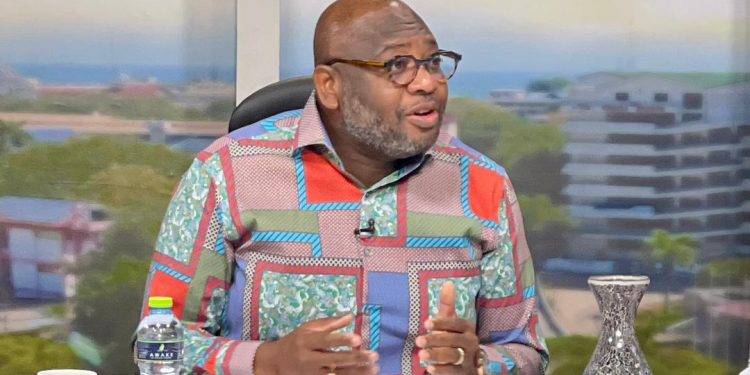Dr. Randy Abbey, a prominent Ghanaian broadcaster and host of Good Morning Ghana on Metro TV, recently recounted a dramatic incident that disrupted the station’s operations during a live broadcast. This incident, which unfolded on November 27, involved the Ghana Police Service and a court bailiff executing a writ of execution related to an outstanding debt Metro TV owes Vodacom. The debt, reportedly unresolved for over three years, has led to legal actions, culminating in an attempted seizure of the station’s assets.
According to reports, the police and bailiff arrived at the Metro TV premises with a court order to halt operations and confiscate assets. The legal move, stemming from a private business dispute, has sparked public discussions, with some attempting to link it to political motives. However, insiders have clarified that the issue has no political underpinnings and is strictly a financial matter between the two entities.
Dr. Abbey provided a vivid account of the tense encounter, describing how the police and bailiff initially sought to seize his personal vehicle under the pretext of the court order. Speaking during his live program later that day, he expressed his frustration over what he termed “unprofessional conduct†by the officials involved.
As he narrated, the situation began when the police intercepted his vehicle upon his arrival at the station’s premises. “I was on my way to start Good Morning Ghana when I noticed a police pickup block my car. The officers then informed me they were there to enforce a court order and planned to seize my car. I was baffled. My vehicle is my personal property, not an asset of Metro TV,†Dr. Abbey recounted.
He further noted that after a heated exchange, the officials momentarily retreated. However, they returned later with an intent to forcibly gain access to the station, even as the live broadcast of Good Morning Ghana continued. This second attempt disrupted operations and drew widespread condemnation.
The broadcaster questioned the legitimacy of the actions taken by the police and the bailiff, highlighting the seeming overreach in their approach. “If you have a legitimate court order, execute it in the proper manner. Why are you targeting me personally? Am I Metro TV? Am I a shareholder or director? What kind of impunity is this?†he lamented.
Dr. Abbey expressed shock over the brazenness of the officials, especially their insistence on interrupting a live program to carry out their mandate. He accused the police officers of acting beyond their authority and described their behavior as unbecoming of law enforcement professionals.
In response to the incident, Ignite Media Group, the parent company of Metro TV, issued a strong statement condemning what it described as an “armed assault†on its premises. The group called for a thorough investigation into the conduct of the officers involved, emphasizing the need to uphold the rule of law and respect for press freedom.
Meanwhile, the Ghana Police Service has launched an internal investigation to ascertain the facts surrounding the incident. Public reactions have been mixed, with some criticizing the police for their handling of the situation and others questioning Metro TV’s delay in resolving the debt issue.
The legal battle between Metro TV and Vodacom dates back several years, with the telecom company pursuing various avenues to recover the debt. The court’s decision to issue a writ of execution reflects Vodacom’s frustration over the prolonged impasse. However, the manner in which the order was executed has raised concerns about the respect for due process and the rights of individuals.
Dr. Abbey’s ordeal has also reignited discussions about the independence and treatment of media houses in Ghana. While the matter appears to be a private dispute, some observers have speculated about possible political undertones, given the high-profile nature of Metro TV and its programming.
Reflecting on the incident, Dr. Abbey urged stakeholders to prioritize dialogue and transparency in resolving such conflicts. “As a media organization, we are not above the law. But the law must also be applied fairly and with respect. This kind of behavior only tarnishes the image of our institutions,†he stated.
The incident has sparked a broader conversation about the challenges facing Ghana’s media industry, including financial sustainability and the need for better safeguards against undue interference. As investigations continue, the outcome will likely set a precedent for how similar disputes are handled in the future.
For now, Metro TV remains committed to its mission of delivering quality programming despite the challenges. Dr. Abbey assured viewers that the station would not be deterred by the incident, reaffirming its dedication to journalistic excellence and accountability.
The story has garnered significant public attention, with many calling for swift action to address the underlying issues. Whether this marks the end of the saga or the beginning of a new chapter remains to be seen, but it is clear that the stakes are high for all parties involved.


